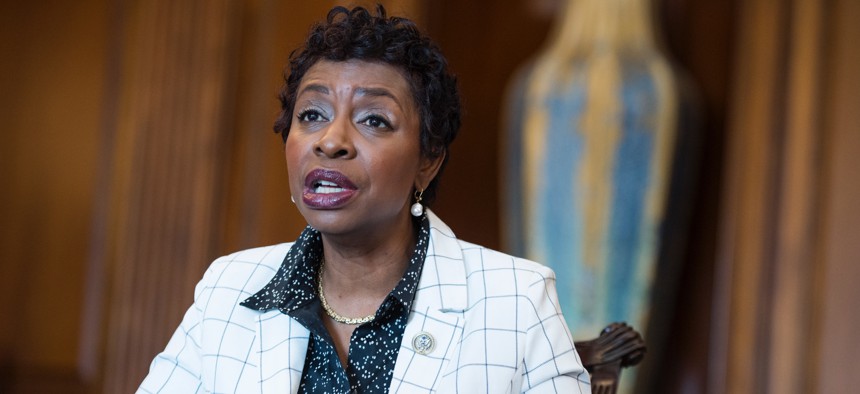New bill would add disclosure requirements for AI in political ads

Rep. Yvette Clarke (D-N.Y.) recently sponsored legislation that would expand political advertising regulations to include AI-enabled ads. Tom Williams / GETTY IMAGES
A new bill from Rep. Yvette Clarke (D-N.Y.) comes shortly after the Republican National Committee released a new ad using generative artificial intelligence.
Rep. Yvette Clarke (D-N.Y.) wants to regulate the use of artificial intelligence in political advertising with a new bill introduced Tuesday that would expand disclosure requirements for campaign ads to include notice of any generative AI used to create videos or images.
The bill comes a week after the Republican National Committee released a campaign ad made with generative AI. The video did have a small disclosure in the corner that it was “built entirely with AI imagery.”
Clarke said in a statement that “our current laws have not kept pace” with AI and pointed to the upcoming election cycle.
“If AI-generated content can manipulate and deceive people on a large scale, it can have devastating consequences for our national security and election security,” said Clarke. “It’s time we sound the alarm, and work to ensure our campaign finance laws keep pace with the innovation of new technologies.”
The use of generative AI and consequent discussion around new regulation in political advertising in particular falls into a larger conversation about the role of the emerging technology and its consequences – in the workplace, in the notice-and-comment process, cybersecurity and more.
Some government regulators say that they’ll be using existing tools even without any additions from Congress.
The FTC’s Vice Chairman, and a Trump appointee, Sean Cooksey told the Washington Post that “As technology like AI evolves and political campaigns continue to innovate, the regulatory solutions will likely remain the same,” noting that “the rules apply regardless of the medium, and AI-created ads are no different.”
And last week, the Justice Department, Consumer Financial Protection Bureau, Equal Employment Opportunity Commission and Federal Trade Commission released a joint announcement about their intention to use existing legal authorities in the realm of automated systems and AI.
“Proper regulation takes time,” Commerce Secretary Gina Raimondo said last week in a public meeting of The National Artificial Intelligence Advisory Committee, which issued recommendations around AI. “We have to come up with some ways to do no harm in the immediate, like this week, next month, three months, six months.”



